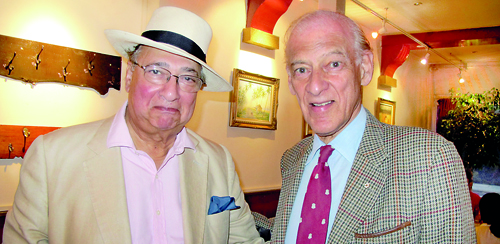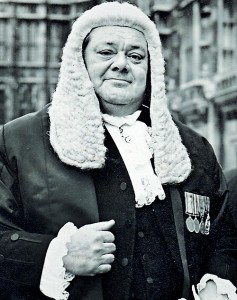Sunday Times 2
A Knight’s tale
Earlier this year I had dinner with Sir Desmond de Silva at Sekara Restaurant – a well known Sri Lankan eating place on Lower Grosvenor Place in London. It was a fascinating evening, made memorable by Sir Desmond’s gifts as a raconteur.
Today, the legal expertise of Sir Desmond de Silva QC, is sought all over the world. The son of Fred E de Silva, MBE, a former MP for Kandy and an Ambassador to France, his grandfather was George E. de Silva, one of the founding fathers of Sri Lankan independence.

Sir Desmond de Silva (left) with Christopher Ondaatje
Having started his career working with my uncle, Noël Gratiaen QC, in the Chambers of Sir Dingle Foot in London, Desmond went on to become head of those very Chambers for 25 years. Now in his fiftieth year of practice he is recognised by the UN and by national governments as an outstanding international lawyer.
Over dinner, he told me a wonderful story about my uncle and a case over 40 years ago for the defence of 10 of Sierra Leone’s political, military and social elite in that country’s first trial for treason. The only available punishment, if they were convicted, was death.
“Gratiaen and I were out in Freetown because, after an eleven month trial, the defendants had been convicted by a local jury,’ de Silva recalled. ‘An indication that the verdicts were fixed by the Government was to be found in the foreman of the jury receiving an OBE in the next Queen’s Honours list on the recommendation of the then President, Siaka Stevens. He was desperate to have the convictions confirmed to ensure the execution of his political opponents and so pave the way for a republic and a one party state.
“Gratiaen and I realised we had an uphill task before the Court of Appeal. However, only one of the three presiding judges was from Sierra Leone. ‘If we won over two of the judges, we would be home and dry.”
Gratiaen and de Silva travelled together from the airport to Freetown. “Our taxi went past the colonial Supreme Court building and up to the Paramount Hotel. We were told that they had no reservations for us and that the hotel was full. Was the government trying to make our lives difficult?”
Before they left in search of somewhere else to stay, de Silva showed Gratiaen the spot in that very hotel where he had been arrested during the original trial. “I was taken to a police station, my braces and shoe laces were removed and I was charged with the criminal offence of smuggling cognac into the prison when I went to see my client.

Noël Gratiaen QC
“A Magistrate dismissed the case against me. Some days later I was re-arrested in relation to the same matter. Despite protestations about double jeopardy, I had to go through another trial. I realised that the Government had decided to harass me until I gave up defending my client and returned to England or toned down my attack in the treason trial.”
The trial had been a travesty from the first day. “The Acting Chief Justice took his seat in Court. On the wall behind him were the Royal Arms as always present in Her Majesty’s Courts. The Queen was still Head of State. Sierra Leone was yet to become a republic.” Ladies who were not wearing hats were obliged to leave the public gallery. “Yes, all the ceremony and some of the trappings of a long forgotten earlier age of English trials were present but fairness and justice found little place!”
“There are moments when, as cross-examining counsel, you realise that not only have you got a lying witness in the box but that appropriate questioning can demonstrate to the court the perjury the witness is committing. Unfortunately for me the witness was a senior cabinet minister in Siaka Stevens’ Government. He was giving evidence about overhearing an alleged conspiratorial conversation between some of the defendants. The art of destroying a lying witness is to lead him up the path of his evidence, getting him to confirm its salient points and then to close the gate behind him so that there is no escape from his perjury.
“The Chief Justice could see where I was going. I could prove that the witness was 200 miles away at a public meeting! Here was a cabinet minister about to be cut down in open court at a political trial. Three days later I was arrested on the trumped up charge. It was the first of many experiences that the fight for justice, truth, and the rule of law can carry great perils. I was still in my twenties.
“I found myself in the dock in the Supreme Court before a Sierra Leonean Judge who, without hearing any evidence, said that this was “a case that required an exemplary sentence”. When I appeared before the Court of Appeal I was shaking with malaria which I had contracted whilst incarcerated in a cell 9 ft long and 5 ft wide, with a stone floor, not a stick of furniture and a tiny aperture high up in the cell wall through which mosquitoes came in by the cloud. I had only one ground of appeal, which was that although I had been sentenced, no one had ever convicted me of anything.
‘”I hope your Lordships will find that a powerful argument,” I said. They did and my sentence was quashed.
‘Noel Gratiaen QC was a bon viveur. He believed that life was best approached with a stiff drink at the ready. His vast girth was testimony to his passion for food. Between great gulps of claret he would wax eloquent about a curried partridge with saffron rice followed by a dark chocolate soufflé.
‘”Where is the bar?” he said, when we arrived at a rather low built building a few minutes drive from the Paramount Hotel. “Come on Desmond, let’s have a nightcap.”
“We drank brandy as I ran through my experiences of the previous year. A covey of revealingly dressed girls sat around, talking among themselves. Little did I realise, but this establishment was a haunt of ladies of the night.
“The bill,” said Noel to the barman.
‘As we were making ready to leave, rather unsteadily, a few girls got up, straightened their tightly fitting skirts, and left the bar area.
“To get to our rooms we had to cross a tree-lined compound and I noticed that there were girls standing beneath the trees. One of them, in a top that could barely contain her ample breasts, approached the very rotund QC and, with a surprisingly delicate choice of phrase, she posed a question that I shall recall to the end of my days.
‘”Excuse me, sir, would you like some mangoes tonight?”
“Yes. Yes,” said Noel, “Just the thing. Bring them to my room at once.”
‘”I wonder if they are Alphonsos,” he said to me as we walked on. “They are aromatic and wonderfully delicious. Some say that before they are eaten they should be massaged like a woman’s breasts to make them more succulent!” Supposing to myself that this must be some subliminal association between food and sex, I bid him goodnight.
“No sooner had I unpacked my bag than I heard angry voices outside my room. I opened the door and was met with a wonderfully theatrical moment. There, standing in the open doorway of Noel’s room, was the girl, now naked to the waist. I was seized with a fit of uncontrollable laughter as Noel, with his true passion now torn to tatters, towered over this nubile beauty and wailed gloomily “But Madam, where are your mangoes?”
“The appeal hearings began in April 1971. Ten people stood in the dock, sentenced to death. If Noel and I succeeded in our arguments they would all walk away from the gallows. In our view their fate turned on the principles established in two cases Rex -V – Molloy, which revolved around a broken grate, and Rex – V – Disney, where the defendant’s conviction for a poaching offence was quashed by the Court of Appeal.”
Sometimes fundamental legal decisions that involve great principles of law spring from facts of the most
unlikely kind.

